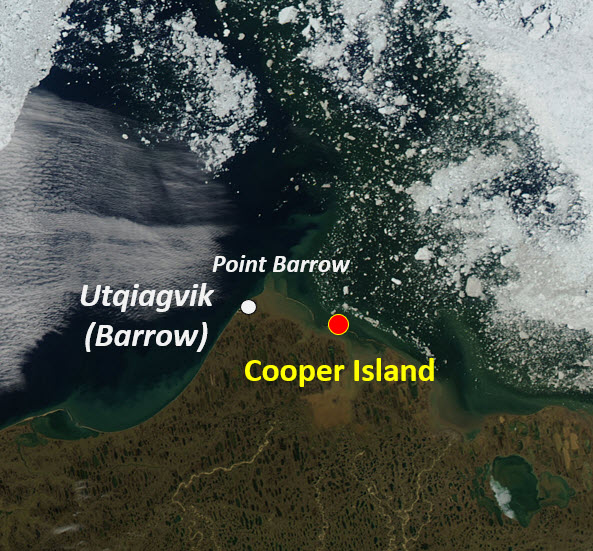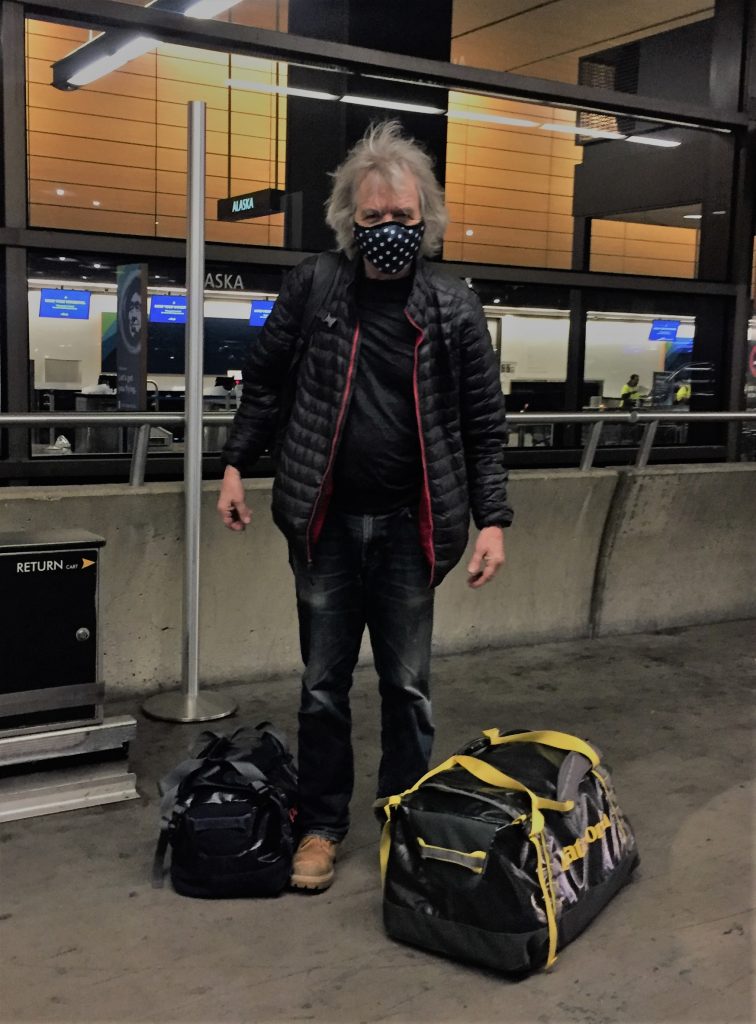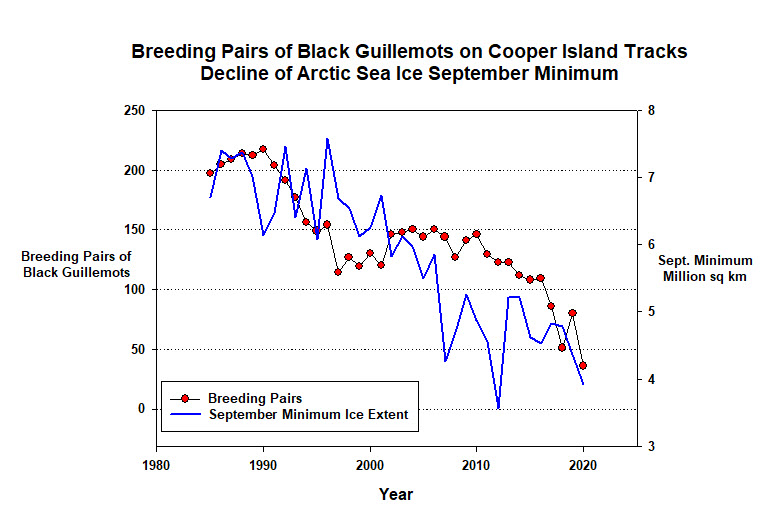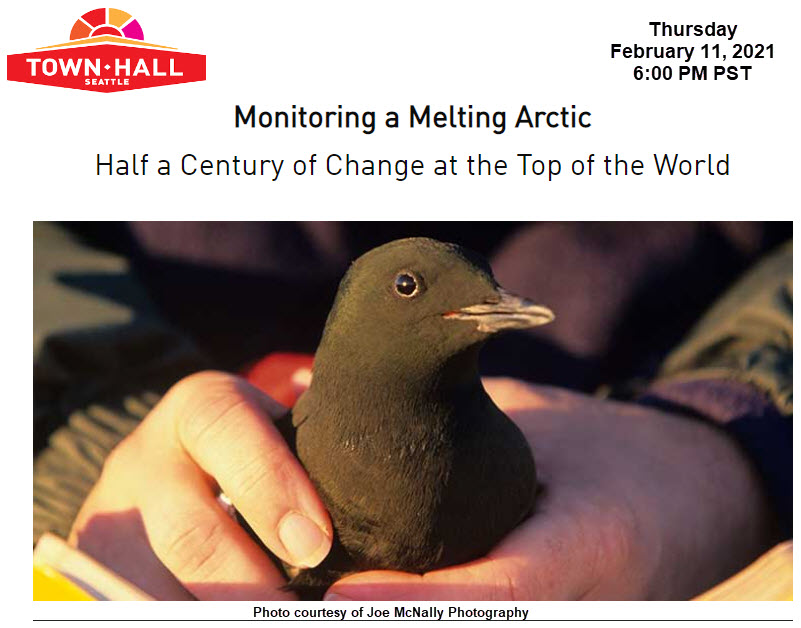Maintaining a long-term study of an Arctic seabird on a remote island off the northern Alaska coast has never been easy. Maintaining that study in 2020, when very few things anywhere in the world were easy, meant dealing with a new set of logistical hurdles and personal dilemmas and sacrifices. Thanks to the extraordinary help of extraordinary friends, however, in this year of such disruption for all of us I am happy to report that, against all odds, we were able to collect data for the 46th straight year on Cooper Island this summer.
During March and April, when I typically would be preparing for my three months on Cooper Island, the emerging pandemic had me and the rest of the world concerned about our health and that of family and loved ones. The existential threat of Covid-19, combined with the isolation of lockdowns and quarantines, forced a reassessment of priorities. In May, agencies and universities around the world cancelled Arctic research planned for the summer of 2020, for both the safety of researchers and the communities they would transit en route to the field.
By early June, I had accepted that 2020 might be the first year in 46 years I would not be spending the summer on Cooper Island. I told myself I would keep busy analyzing the decades of existing data and collaborating with my scientific collaborators in Alaska, Canada, and France, keeping in contact through “new normal” virtual conferencing. I could resume field work in 2021, if a field season this year was not possible.
For that reason, I was surprised – and elated – when two colleagues in Utqiagvik (formerly Barrow) contacted me in mid-June, wondering when I might be coming north and going out to my cabin on Cooper Island. The close proximity of Cooper Island to the village of Utqiagvik (25 miles distant) has been a major factor in allowing me to study the island’s seabirds since 1975. Even more important has been the logistical support and encouragement its residents have provided. The indigenous people of Arctic Alaska have let me visit their land for the last half century and have helped me in innumerable ways. I have been fortunate to become friends with many Utqiagvik residents. That some of these friends wanted to know what they could do to help get me out to Cooper Island in 2020 meant more than I can say.

In mid-July, after a negative virus test in Seattle and one on arrival in Utqiagvik, I flew out to the Cooper Island field camp – arriving later in the season than I ever have, but extremely thankful that there would not be a break in the long-term data set. Thomas Leicester, a student at McGill University in Montreal who had been on the island in 2018, was able to come out with me for the first week to assist in the major task of converting the 8×12 ft cabin from an overwinter storage shed to summer living quarters.

As with most everything else in 2020, my first few days on the island felt unlike past years. I typically spend the first week in the field feeling vulnerable and concerned about my safety as I accept the risks involved in living on a remote island with limited communication – and now regular visits by polar bears. This year was different in that, on arriving on the island, my anxiety decreased once I could take off my mask and pick up a shotgun, as I realized I did not have to be preoccupied with the social distancing, mask protocol, and access to hand sanitizer that had become part of my life. While both Covid-19 and polar bears can be existential threats, the logistics of dealing with the latter seemed relatively straightforward compared to navigating through a global pandemic.
While my spirits were high at the start of a field season I had thought would be “impossible,” they were soon brought down as it became clear 2020 would again find me documenting the long-term decline of a seabird species in response to the ongoing decline of its preferred sea ice habitat. 2020 had the second lowest minimum Arctic sea extent on record, with only 2012 having less ice. Both the size of the Black Guillemot colony and the extent of Arctic sea ice continued their declines in 2020.

Only 36 pairs of Black Guillemots laid eggs on Cooper Island in 2020, compared to 80 pairs in 2019. Most pairs abandoned their nests during incubation with hatching occurring in only 11 nests. Surprisingly, fledging success for those chicks was high, with over 90 percent surviving to fledging. And it is intriguing (and will be the subject of further analysis) that the successful parents were significantly more experienced (average of 9.2 years of breeding experience) than birds that abandoned or failed to hatch eggs (average 3.8 years of experience). A long-term study of a colony of color-banded birds can provide insights like that while also allowing a personal connection to individual birds. One of 2020’s successful parents was a bird I banded as a nestling in 2001 and has bred (and shared the island with me) every year since 2003.
I feel so fortunate to have been able to collect this data, even though the news from the colony does not make one optimistic for the long-term. There is much more to share about this past summer and the ongoing analyses we are conducting with our collaborators. We look forward to including that in future posts and also during our Annual Update on Thursday, February 11, 2021 at 6 pm, which this year will be an online presentation from Town Hall Seattle. While we miss seeing our Seattle friends and followers in person, this virtual event will allow us to reach a larger and more geographically diverse audience. Town Hall’s virtual platform even allows for “audience” questions. We hope to “see” and interact with many of you then.
While 2020 frequently had our attention focused on more immediate concerns, there is increasing evidence of the reality of global warming and the need to address its causes. Our long-term study of Black Guillemots continues to demonstrate the biological and multi-decadal effects of the loss of Arctic sea ice. We remain hopeful that the new year will give all of us an opportunity to focus more on the major challenges ahead in confronting the causes of climate change. And we want to thank all those who have made our research possible by providing financial, moral and logistical support over the years – with special thanks this year to the North Slope Borough, their Department of Wildlife Management and Search and Rescue pilots and crew, who made the “impossible field season” of 2020 a reality.
